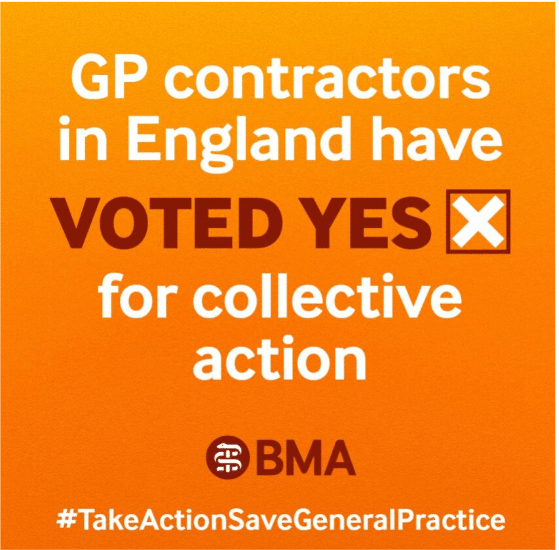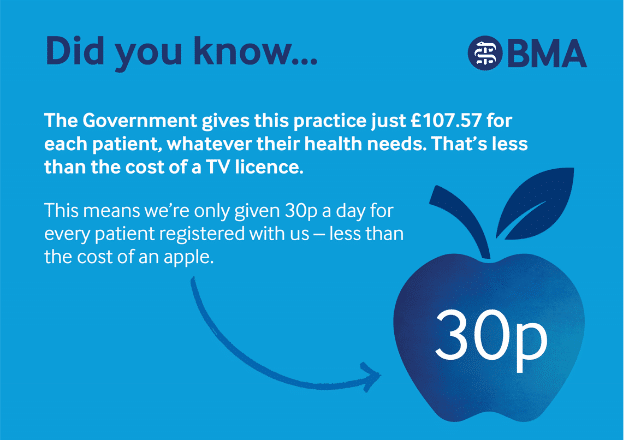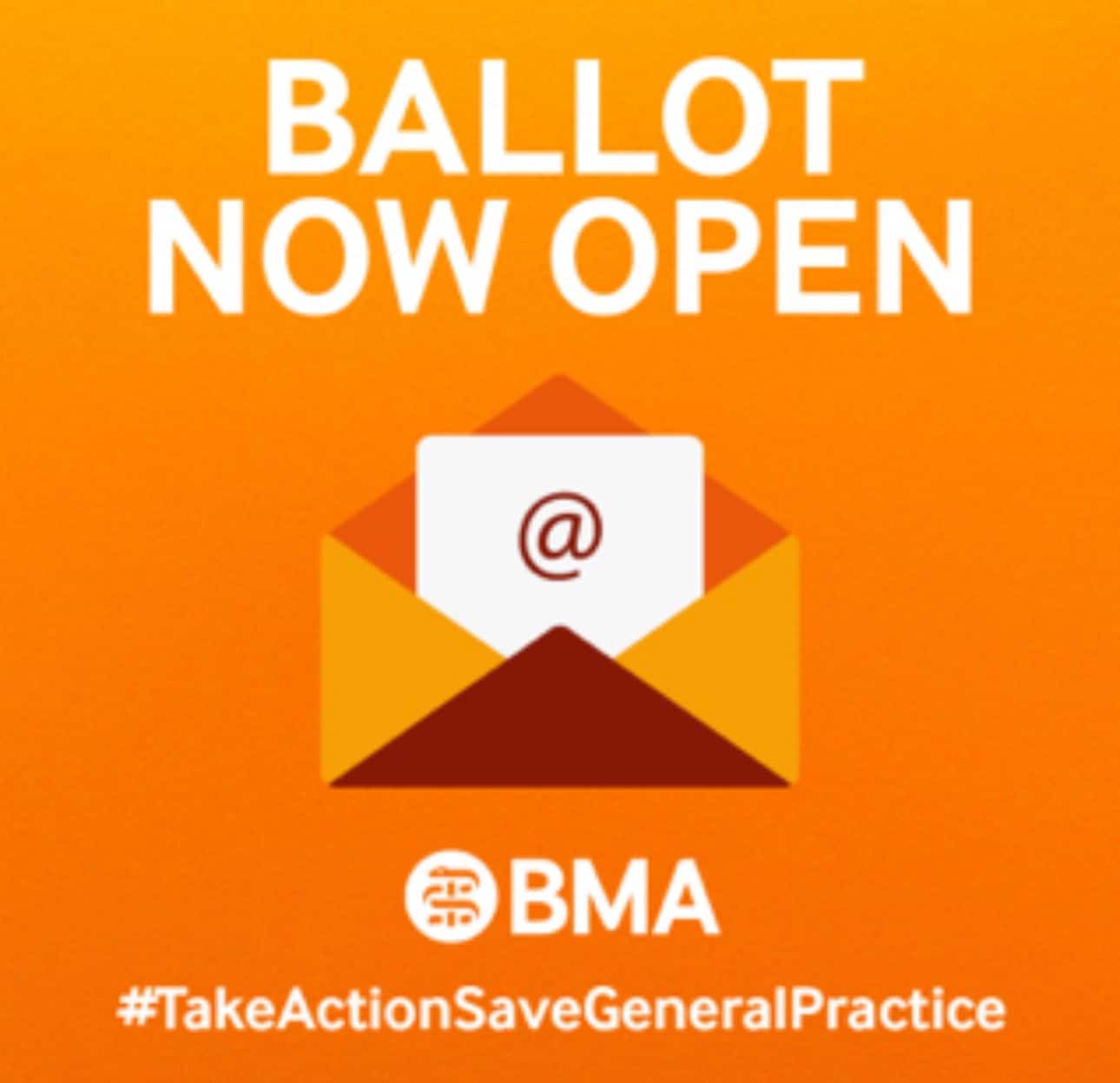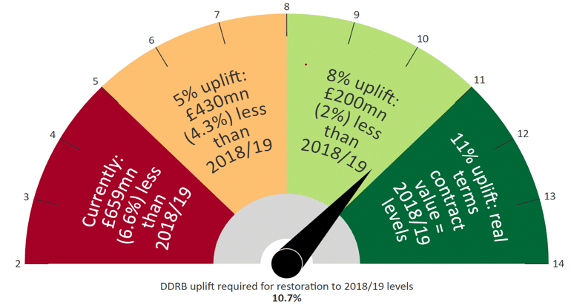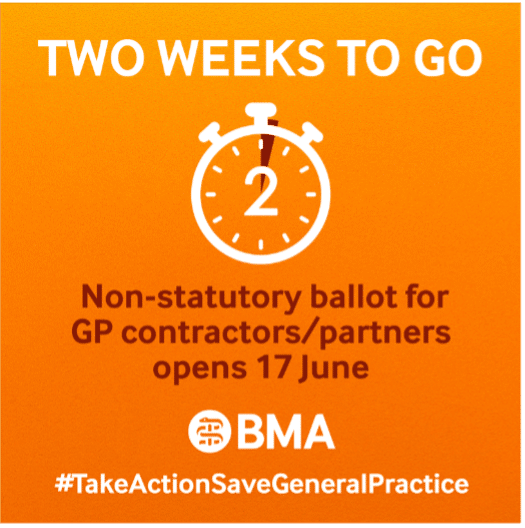GP Action
The GPs Committee England met last week where we discussed the next steps of GP collective action as part of our ‘Protect your Patients and Protect your Practice‘ campaign and other upcoming issues affecting general practice.
We would encourage practices to continue to take action using our safe sustainable action menu. It is up to each practice to choose which actions to take, and whether to do one, or many. None of them represent a breach of your contract, but they will help you manage your workload and keep you and your patients safe. Your LMC will also provide you with additional advice, tailored to local arrangements.
Our GP practice survival toolkit provides for a menu of actions you can choose from, to support a safer delivery of services for patients and practice team:
- Limit daily patient contacts per clinician to the UEMO recommended safe maximum of 25
- Serving notice on voluntary services that plug local commissioning gaps
- Cost up the value of providing locally commissioned services and serve notice on contracts which are undermining practices’ ability to sustain a service
- Withdraw permission from secondary-use data sharing agreements
- Freeze sign-up to new data sharing platforms
- Stop engaging with the e-Referral Advice & Guidance pathway
- Stop rationing referrals, investigations, and admissions
- Switch off GP Connect Update Record Functionality
- Ignore medicine optimisation software which diminishes patient choice in return for system savings never seen by GP practices
- Defer your PCN declaration regarding online triage to 2025
We are urging the Government to engage constructively with us as soon as possible to determine short, medium, and long-term solutions to save General Practice.
Find out more here.
GP Additional Roles Reimbursement Scheme (ARRS)
The updated PCN DES bringing in the GP ARRS was released last week. Pay for these roles will be set at the lowest level of the DDRB recommended sessional pay range, with PCNs able to claim up to £92,462 (including on costs), together with London weighting if applicable. The funding available to PCNs to fund these roles will be £1,303 multiplied by the PCN Contractor Weighted Population on 1 January 2024. The GP in ARRS allocation is separate to the pre-existing ARRS allocation, and PCNs cannot cross-subsidise between the two funding streams
GPs employed via the Scheme must be within 2 years of their CCT on 1/10/24 and PCNs will be required to provide terms no less favourable than the BMA salaried GP model contract, in line with the GMS/PMS contract. There are, however, no requirements on how these GPs should be utilised within the PCN. GPC England and the Sessional GPs Committee will be releasing guidance for PCNs, and individuals employed under this scheme, shortly.
Whilst there is progress in acknowledging the difficulties currently faced by many GPs struggling to find jobs, we continue to stress to NHSE and the DHSC the underlying issue of GP unemployment and how this needs to be better addressed through additional support and funding at a practice level.
Safe working guidance
Last month we published a safe working guidance handbook to help GPs and practices in the delivery of safe, high-quality care for their patients and communities. The profession wants to provide care without risk to patients or ourselves. The handbook embeds and prioritises safe high-quality care for your patients by focusing on the delivery of prioritised core GP services. These actions will work, and will build growing leverage in the months ahead to support us in negotiations for you and your practice team.
Read more on Safe working, including social media graphics and a poster.
Shortages of doctors and patient increase – BBC analysis
A BBC analysis of NHS data has shown that the average GP in England has to care for 17% more patients than nine years ago. The areas struggling the most have more than 3,000 patients, nearly double those with the most doctors. The government said it was developing plans to train more doctors and relieve some of the pressure by giving pharmacists more responsibilities.
The GPCE Chair, Dr Katie Bramall-Stainer said these figures lay bare the realities of the workforce crisis in general practice and demonstrate how practices have been expected to keep doing more for less. This has led to the closure of 2,000 GP practices since 2010. General practice is collapsing. Rather than giving pharmacists more responsibility, patients want more GPs and we agree with them.
Labour party conference update
Last week GPCE Officers attended the Labour Party Conference. The NHS, and particularly general practice, was a key conference topic, alongside the Darzi Review and the NHS ten-year plan, anticipated for release next spring. Dr Katie Bramall-Stainer and Dr Samira Anane met with a number of MPs including Minister of State for Care, Stephen Kinnock, PPS to Wes Streeting, Mr Zubir Ahmed, Dr Simon Opher, Dr Beccy Cooper, Leigh Ingham, Nesil Caliskan and Josh Dean. Dr Bramall-Stainer also spoke at the BMA’s roundtable attended by a number of MPs. During these meetings GPCE outlined our upcoming strategy for the new Government; our priorities and our recommendations to urgently address the crisis in general practice and GP unemployment.
GP pressures: latest workforce and appointment data
GPs continue to treat many more patients than they have done in the past. The latest data shows a record 63.47 million patients registered with practices in England, while there are over 1,000 fewer GPs compared to 2015.
As a result, each full-time equivalent GP is now responsible for an average of 2,282 patients, 345 (or 18%) more than in 2015, and appointments level at an average of almost 1.5 million per day. All of this puts staff at your GP surgery under immense strain, with knock-on effects for patients.
Learn more about the pressures on general practice
RCGP changes position on physician associates
At its September UK Council meeting, the RCGP voted to oppose a role for physician associates in general practice, with 61% of members voting for the change of position. However, the college will still be pushing ahead with planned guidance development given the pe-existing presence of PAs in general practice. The RCGP also voted to expunge a paragraph from their draft scope of practice guidance which would have exempted PAs already working in general practice from the scope limits. The college now plan further work on this guidance before publication.
GPC UK recently published the guidance Physician associates in general practice: making it safe for patients and GPsand will be discussing the RCGP’s change in position at its next meeting on 17 October.
New dispensing feescales
The new dispensing feescales for England and Wales, effective from 1st October 2024, have been published, showing a reduction in the average dispensing fee to 218.7p per item (average), a decrease of 0.2p compared with April 2024. This reduction is based on a new methodology designed to further smooth out the fluctuations seen in the previous biannual fee adjustments.
Dispensing fees are intended to cover the costs of running a dispensary, including staff expenses. However, from April 2025, the average fee is set to reduce further by 5.37p per item (on average) to 213.3p (compared to the October 2024 rate). This continued downward trend may prove to be a tipping point for some dispensing practices, as the cumulative impact of underfunding in rural practices takes its toll. GPC England continues to work closely with the Dispensing Doctors Association; both organisations recognise and promote the value of dispensing practices to their patients and within their communities.
